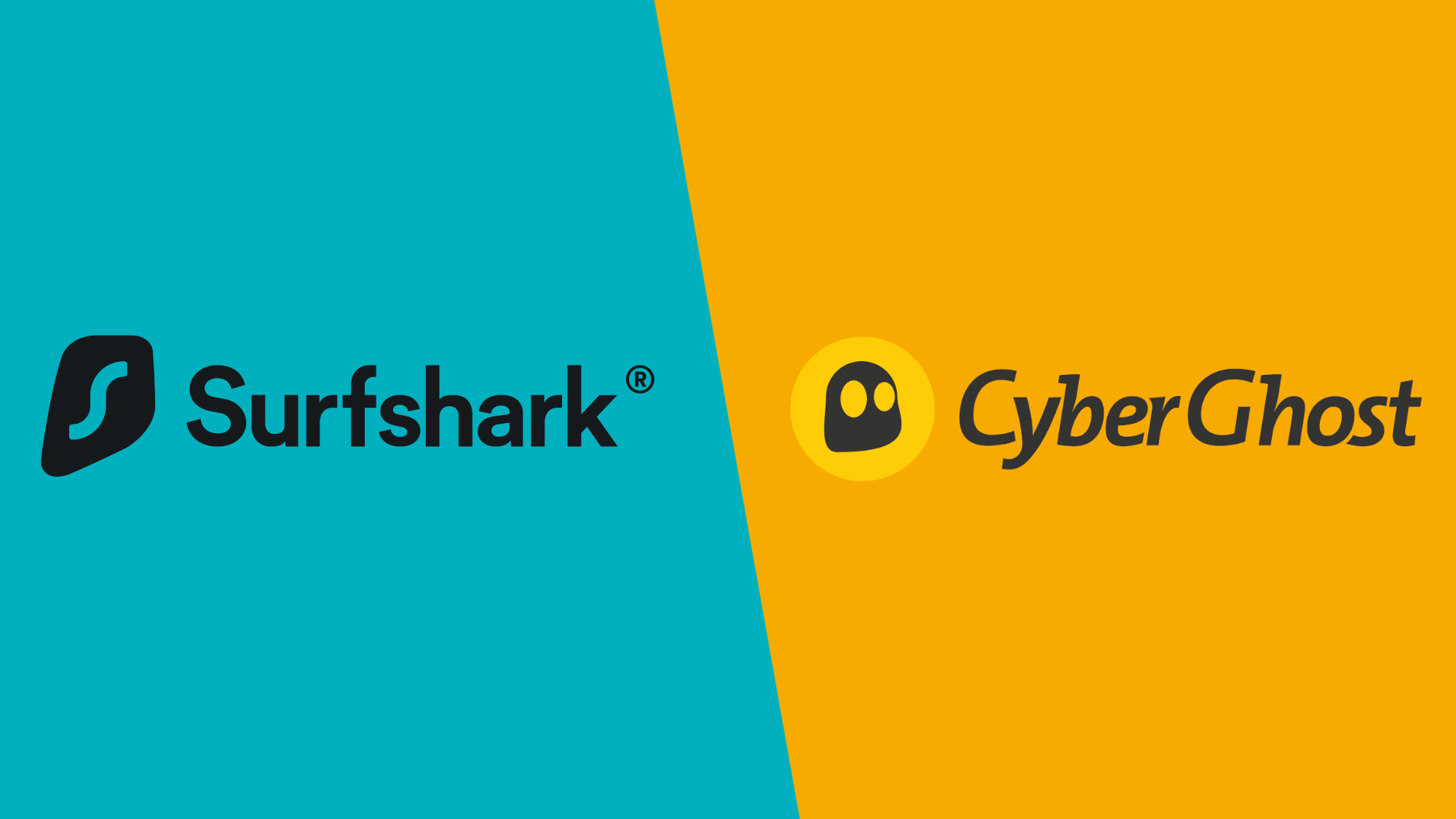Surfshark vs CyberGhost - which VPN is better in 2024?
Two privacy titans, but which is superior in 2024?

It’s easy to assume you need to spend serious cash to get one of the best VPNs, but if you take the time to look into it, there are some budget-friendly VPNs that can hang with the champions of the VPN industry. Take CyberGhost and Surfshark, for instance. They’ve both made it to our best cheap VPN list for a reason, as both providers punch well above their weight, packing best-in-class security with supercharged speeds, without the price knocking you out.
To help you decide which cheap VPN wins this brawl, I’m going round for round comparing their strengths and weaknesses across areas such as price, privacy, performance, streaming capabilities, app availability, and extra features. Read on and you’ll find out which budget VPN takes home the title for best cheap VPN.
Surfshark vs CyberGhost: Specs comparison
Surfshark vs CyberGhost: Specs comparison
Lowest monthly cost: Surfshark: $2.19 | CyberGhost: $2.03
Number of servers: Surfshark: 3,200+ | CyberGhost: 9,200
Server countries: Surfshark: 100 | CyberGhost: 100
Maximum simultaneous connections: Surfshark: unlimited | CyberGhost: 7
Money-back guarantee: Surfshark: 30 days | CyberGhost: 45 days
If you look at the top-level figures comparing Surfshark and CyberGhost, there's little to separate the two in terms of the offerings available. However, if you're looking for sheer value, it's clear that CyberGhost would likely be the provider to turn your head. With a 45-day money-back guarantee and a lower cost per month, it's the easy choice for a simple low cost, but the decision isn't quite as simple as that.
The availability of services is also a pretty even battle between the two. While it would appear CyberGhost has a clear win over Surfshark in terms of server numbers, Surfshark's servers span a larger number of locations, giving you greater freedom to choose where you're searching from. Plus, you're not likely to be limited by app availability, with both providers offering apps across Windows, Mac, iOS, Android, and more.
One early win for Surfshark comes in the form of the connection numbers. Unlimited simultaneous connections is something you'll rarely see from even some of the best-known VPN providers, so you're already getting more than usual. What's more, CyberGhost's service is limited to only seven devices at a time, with certain device types even taking up those precious few connections outside times they're in use, leaving you more limited than you'd expect compared to some of the competition.
Surfshark vs CyberGhost: pricing
Surfshark vs CyberGhost: pricing
Both providers work out pretty cheap if you buy into a long-term deal, but they’re about on par with the rest of the industry on a monthly rate. CyberGhost’s monthly plan is $12.99, in line with standard VPN pricing. Buying into its six-month plan drops this down to $6.99 per month, totaling $41.94 for six months, and its two-year plan, which includes an additional four months for free, works out at $2.03 per month, totaling $56.94 overall. Whichever way you look, it's fantastic value for money.
However you split it, you will always pay a little more for Surfshark. Surfshark's pricing starts at $15.45 per month for its shortest plan. There’s no six-month plan, but purchasing the twelve-month plan massively reduces the cost to $2.79 per month including an extra three months for free, totaling $41.85 for fifteen months. The two-year plan is the best value for money, at $2.19 per month with three months free, amounting to $59.13 for twenty-seven months of protection.
Both Surfshark and CyberGhost have “cool-off” periods where you can claim a refund with no strings attached if you want to try them out. For Surfshark, there’s a 30-day money-back guarantee on 12 and 24-month plans. CyberGhost goes a step further, as its six-month and two-year subscription plans come with a whopping 45-day money-back guarantee. Plus, if you’re buying the monthly subscription, you can still access a 14-day money-back guarantee.

Although each VPN has a bunch of features packed into the base subscription price, there are also a few unique additional paid features that might tip the balance for you.
Surfshark keeps things simple with add-ons. Instead of a bunch of extras you can choose from individually, Surfshark has the One and One+ packages, designed to upgrade your internet security with Alert, Search, and Antivirus. At only $0.50 a month more, Surfshark One is shockingly good value. What's more, with its next plan, One+, Surfshark offers you the chance to remove your data from company databases and people search sites, leaving you less at risk of being exposed by data breaches.
By comparison, CyberGhost doesn’t offer as much in terms of value for extra add-ons. There’s a password manager you can purchase for $3.49 a month, as well as the Windows Security Suite at $4.50 a month and dedicated IPs for $5 a month. I’ll get into why these tools aren’t quite worth the upgrade later on, but for now, I think it’s evident that Surfshark offers a lot more for a lot less.
Surfshark vs CyberGhost: privacy and logging
Surfshark vs CyberGhost: privacy and logging
One of the main reasons we’re happy to recommend both CyberGhost and Surfshark is that they undergo regular audits on their servers. Whichever one you end up going with, you can be sure you’re using a provider that takes privacy and security seriously.
CyberGhost proudly boasts its no-logs policy. The reason CyberGhost can do this is thanks to its RAM-only server architecture. Essentially, its servers run everything without ever saving data to a hard drive. As soon as the server is turned off, all the data it’s handling is lost immediately. It’s a cool claim, but the important part is that CyberGhost’s implementation of a no-logs policy has been independently audited by Deloitte - twice.
When it comes to its app, CyberGhost is similarly serious about security. It uses AES-256 encryption, which is a standard trusted by governments and financial institutions to securely transmit data. To power the actual VPN tunnels, CyberGhost offers a selection of proven VPN protocols that are held in similarly high esteem, these being OpenVPN, IKEv2, and WireGuard.

CyberGhost certainly comes out pretty well from a security standpoint, but Surfshark holds up just as well. Like CyberGhost, Surfshark holds a comprehensive no-logs policy backed by an independent audit from Deloitte. Not only does Surfshark invest in demonstrating they don’t hold user logs, but it has also reached out to renowned software auditor Cure53 multiple times to ensure that its apps are as secure as can be. In terms of protocols, Surfshark shows that it's putting user security first by only offering secure VPN protocols such as OpenVPN and WireGuard.
Neither provider has had a serious security breach, the only thing you could hold against CyberGhost is that a local code execution exploit was discovered in CyberGhost’s Windows app, which was promptly reported by a third-party security researcher on discovery and patched immediately. Software slipups like this happen and it’s a demonstration of CyberGhost’s commitment to their bug-bounty program that this discovery was welcomed and acted upon quickly.
So, who wins here? I’d say both providers pass with flying colors for data safety. Of course if they didn’t, I wouldn’t even consider them.
Surfshark vs CyberGhost: performance
Surfshark vs CyberGhost: performance
In terms of performance, both Surfshark and CyberGhost performed impressively in our latest round of VPN testing. However, this doesn't stop there being a notable difference between the two providers' capabilities.
First up, CyberGhost. Testing over OpenVPN yielded an average speed of 360 Mbps, while switching to WireGuard saw a notable improvement to an average of 760 Mbps.
These are great speeds, but Surfshark excels even further when it comes to performance. Over OpenVPN, Surfshark achieved nearly double CyberGhost's speed at an impressive 640Mbps. When utilizing WireGuard, Surfshark's speeds capped out our testing framework at 950Mbps.
Both providers offer more than sufficient speeds for virtually any web application, easily supporting multiple 4K streams, even at their lowest speed. That said, Surfshark takes this round with ease.
Surfshark vs CyberGhost: streaming
Surfshark vs CyberGhost: streaming
A deciding factor for any VPN is how well it bypasses geo-restrictions on streaming platforms. A high-speed VPN is great, but it’s not much use if the streaming platforms you usually connect to are blocked. The only way you can be sure a VPN provider is making the effort to update its IP pools is to try and connect yourself and see if you can still access the services you love.
In our testing, Surfshark was able to cope with every streaming service I threw at it. Not only successfully unblocking Netflix libraries in the US, UK, Australia, Canada, and Japan, but I could also access BBC iPlayer, ITVX, Channel 4, HBO Max, and Peacock without any issues. I even took Surfshark down under to try out some Australian platforms and found that both 9Now and 10Play worked without any issues. Amazon Prime and Disney+ are usually hard nuts to crack, but Surfshark came through. That’s about as good as a VPN provider can get.
I can also say the same for CyberGhost. Netflix, BBC iPlayer, Amazon Prime, Disney+, everything I tried out worked as well as Surfshark. There’s only one streaming platform I couldn’t access no matter what I tried, which is 10Play. If Australian streaming is that important to you, I’d definitely recommend Surfshark over CyberGhost. Otherwise, it’s a coin toss.
Surfshark vs CyberGhost: apps
Surfshark vs CyberGhost: apps
Whether you're a new user who’s just looking for a simple app you can just press “play” on, or a hardcore user who’s not afraid to spend half an hour in the options menu setting up your VPN exactly as you like, a good VPN app is essential to ensuring a seamless connection.
You might be taken aback by how simple Surfshark looks when you open it up, but don’t let that fool you. The simplest way to use Surfshark is to hit the big “connect” button and let it do its magic. If you need to specify a location, there’s a list of servers broken down into multiple categories, and an option to save your favorite servers for quick access later. It’s all logically laid out with clear labels, but you might not be able to figure out what “MultiHop” servers are at first glance.
All of the Surfshark One tools are built into the side of the app, making it easy to access security tools as you need them. It would’ve probably been easier for Surfshark to provide all of these separately, so it’s nice to see they’ve gone the extra mile to make Surfshark One a cohesive experience.

The same can be said about CyberGhost’s desktop app. The one advantage I feel that it has over Surfshark is that it hides all of the extra features and options behind a fold-out menu, allowing you to get to grips with the core VPN first.
CyberGhost's server menu is meticulously organized, categorizing servers based on the intended use, whether for streaming, torrenting, or gaming. This structured approach allows you to swiftly locate and connect to the most suitable server without trial and error. While we didn’t notice a huge difference connecting to these servers, there’s probably some extra load balancing in place during peak hours to ensure those connected to these servers can stream comfortably.
Which app wins out here? I think it’s too close to call. For minimalism, I'd give it to CyberGhost, but Surfshark packs a huge amount of functionality into a very elegant package.
Surfshark vs CyberGhost: extra features
Surfshark vs CyberGhost: extra features
Long gone are the days when just offering the best core VPN service was enough to justify the cost of a VPN. Most top-tier VPNs have that functionality completely nailed down, and are now expanding into offering wholesale security suites to distinguish themselves from the competition. everything on offer from Surfshark and CyberGhost makes sense.
I have to say that Surfshark wins out here if you’re interested in identity protection. The Surfshark One suite has so much extra functionality built in here that it’s genuinely impressive, easily competing with other far more expensive providers such as NordVPN. Its key features, Alternative ID, Surfshark Search, and Surfshark Alert, all provide part of a complete security experience, offering you fake online identities, secure, ad-less searching, and data breach alerts respectively.
Plus, if you choose Surfshark's One+ plan, you can access the full power of Incogni, which sends out data deletion notifications to the thousands of data processing companies that make money on selling your data to advertisers. Incogni also covers all of the hassle of reporting companies that won’t respond to their inquiries, making it the perfect way to remove any unwanted data from the web.

CyberGhost doesn't come close to Surfshark when it comes to extra features. The main extra available with CyberGhost is the Windows Security Suite, which includes an anti-virus engine and a software update suite. If you’re already paying for a good antivirus solution on top of Windows Defender, there’s not much point in the suite. The only real advantage it offers is automatic updates for outdated software, but that’s something you can do yourself for free. That said, it’s a cheap solution compared to most other providers and it’s arguably as powerful as what Surfshark offers.
One benefit that is available with both Surfshark and CyberGhost is a dedicated IP. Whether you buy CyberGhost or Surfshark’s version, you’re getting access to what is basically the same thing: A VPN IP address that only you are allowed to connect to. This means no more getting banned from sites you want to use because someone else has abused the VPN. This is also a more reliable way of accessing geo-restricted content since only you will be using the IP to access the streaming service you need.
While CyberGhost has put up a great fight so far keeping toe to toe with Surfshark, this is the one area where it’s clear Surfshark is ahead. There’s so much value in Surfshark One if you’re concerned about your online presence. CyberGhost doesn’t offer anything particularly exciting, and each tool on offer costs more than the entirety of Surfshark One.
Surfshark vs CyberGhost: which is better?
Surfshark vs CyberGhost: which is better?
If you pick either provider you’re getting one of the best VPNs on the market. So, if you’ve already seen a feature that’s essential for your needs, don’t worry about what I’m going to recommend: Your use case will always override my opinion. That said, I have to give this one to Surfshark on points.
There’s not much in it in terms of price, but Surfshark wins out overall in terms of sheer value for money. While CyberGhost works out very slightly cheaper, the extra pennies you’ll pay for Surfshark One translate into a huge amount of added functionality.
That said, if you’re looking for a cheaper VPN and you’re only interested in using a VPN, CyberGhost is the better option. I’m not terribly enthusiastic about their paid add-ons but the core service is easily as good as Surfshark.
If either provider doesn’t quite suit your needs and you’re willing to spend a little extra, you might be better off looking into NordVPN instead. It’s our top VPN recommendation because it outperforms every other VPN we’ve tested in terms of speeds, features, and unblocking, and all at an affordable price with a 30-day money-back guarantee.

Sam Dawson is a cybersecurity expert who has over four years of experience reviewing security-related software products. He focuses his writing on VPNs and security, previously writing for ProPrivacy before freelancing for Future PLC's brands, including TechRadar. Between running a penetration testing company and finishing a PhD focusing on speculative execution attacks at the University of Kent, he still somehow finds the time to keep an eye on how technology is impacting current affairs.
- Rob DunneVPN Editor